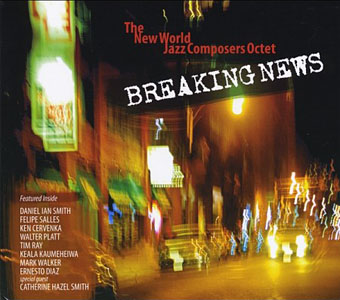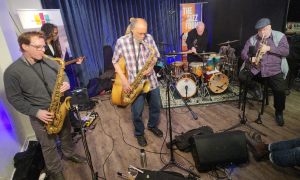Home » Jazz Articles » Live Review » Tedeschi Trucks Band: Denver, CO, November 18, 2011
Tedeschi Trucks Band: Denver, CO, November 18, 2011
Fillmore Auditorium
Denver, CO
November 18, 2011
Fate demanded the Tedeschi Trucks Band. It's been an inexorable march over the last decade and now it's paid off.
Susan Tedeschi released her first album, Just Won't Burn (Tone Cool, 1998) 13 years ago. She sported girl-next-door good looks and a contrasting take-no-prisoners voice. Over the years she released four more albums under her name. Derek Trucks, meanwhile, became co-lead guitarist in the Allman Brothers Band in 1999, after jamming with the band starting at age 12. He landed those gigs with his child-prodigy talent and the fact that his uncle is Butch Trucks, an original drummer with the Allman Brothers. Since the Allman Brothers Band is really only a part-time gig, he formed the Derek Trucks Band in 2002. Tedeschi and Trucks first met during an Allman Brothers tour in 1999 and married in 2001. Since that time they've appeared on each other's albums and toured together, with Tedeschi joining the Allman Brothers in concert for a few tunes many nights. She's known for standing between Trucks and Warren Haynes on stage, fearlessly strapping on a guitar and going toe-to-toe with two of the best blues/rock guitarists on the scene today. The Tedeschi Trucks Band was inevitable. The only question is why it took so long.
Friday night at the Fillmore in Denver, the band deployed eleven band members: bass, keyboards, two drummers, two backing vocalists, three horns, Tedeschi on vocals and guitar, and Trucks on guitar. The band sounded like a soulful version of the Allman Brothers with a horn section, some rippin' female vocals and sweet harmonies. The similarity goes far beyond the mere fact that Trucks is in both bands. Bassist Oteil Burbidge is in both bands as well, and like the Allman Brothers, the family connection is strong with Burbidge's brother Kofi playing keyboards in TTB. With his long blonde ponytail, Trucks himself looks a little like Gregg Allman from a couple decades ago.
As befits the band's name and their talents, Tedeschi and Trucks were the focal point of the band, with Tedeschi front-and-center and Trucks slightly to the left. Although the band left plenty of space for instrumental breaks, the songs had vocals that kept the spotlight on Tedeschi most of the time. She usually had a Telecaster or Les Paul strapped on while she played rhythm, but stepped out for several solos. Trucks, of course, handled most of the guitar solos and more often than not, played slide with an almost machine-like precision. He didn't use a pick, but instead appeared to use most or all of the fingers on his right hand, building many of his solos to dramatic climaxes that started so quietly, he could barely be heard above the ambient Fillmore din. Several minutes later, the volume was at the other end of the spectrum, as the anguished cries furiously leapt from his guitar.
Tedeschi's vocal style was occasionally sweet and pure on the ballads, but more often took on an earthier, down-and-dirty quality perfectly suited for the blues. A highlight was the slow blues cooker "That Did It," in which she detailed all the stupid and selfish stunts pulled by her ex-lover. The singer poured out her pain with such force and agonizing detail that by the end of the tune, about half of the male members of the audience were ready to go find the son of a gun that done her wrong and school him on how to treat a woman right. Apparently she wasn't singing about Trucks—they got along much better; at one point trading licks and although they never played the kind of twin guitar lines made famous by the Allman Brothers, it still gave new meaning to the phrase "marital harmony."
Being an 11-piece band allowed for plenty of opportunity to mix and match musicians and soloists. The Burbidge brothers got together for some bass/keyboard interludes, featuring interplay by two musicians who knew exactly what the other was doing and where he was going. All the horns had a chance to solo once or twice throughout the evening, and the drums had a turn toward the end of the evening. All the different soloists kept the sound consistently fresh.
The majority of Friday night's program was drawn from the band's only album to date, Revelator (Sony Masterworks, 2011). However, the band threw in a number of covers, almost all of which were hits before either band leader was born (Tedeschi 1970, Trucks 1979). "Everybody's Talkin,'" written by Fred Neil, was a hit for Harry Nilsson in 1969, but TTB's version was much more energetic than the folkier hit version from over 40 years ago. They also did "Darling be Home Soon," originally a hit for the Lovin' Spoonful in 1967, but later covered by Joe Cocker in 1969. Toward the end of the show, the band's soul roots would not be denied as they delivered Stevie Wonder's "Uptight," a hit in 1966. They followed that with the original "Love Has Something Else to Say," which merged with Bill Withers' 1973 hit "When I'm Kissing My Love," sung by trombonist Saunders Sermons to close the set. The encore went further back still, starting with the traditional gospel tune "Wade in the Water," with the two backing vocalists coming right down front for some sweet three-part harmonies with Tedeschi, and ending with a funky Sylvester Stone medley of "Sing a Simple Song" (1968) and "I Want to Take You Higher" (1969).
Fate demanded the Tedeschi Trucks Band. Fate has finally paid off
Tags
Tedeschi Trucks Band
Live Reviews
Geoff Anderson
United States
Susan Tedeschi
Derek Trucks
Allman Brothers Band
Derek Trucks Band
Gregg Allman
joe cocker
Stevie Wonder
Saunders Sermons
About Tedeschi Trucks Band
Instrument: Band / ensemble / orchestra
PREVIOUS / NEXT
Support All About Jazz
 All About Jazz has been a pillar of jazz since 1995, championing it as an art form and, more importantly, supporting the musicians who make it. Our enduring commitment has made "AAJ" one of the most culturally important websites of its kind, read by hundreds of thousands of fans, musicians and industry figures every month.
All About Jazz has been a pillar of jazz since 1995, championing it as an art form and, more importantly, supporting the musicians who make it. Our enduring commitment has made "AAJ" one of the most culturally important websites of its kind, read by hundreds of thousands of fans, musicians and industry figures every month.

























